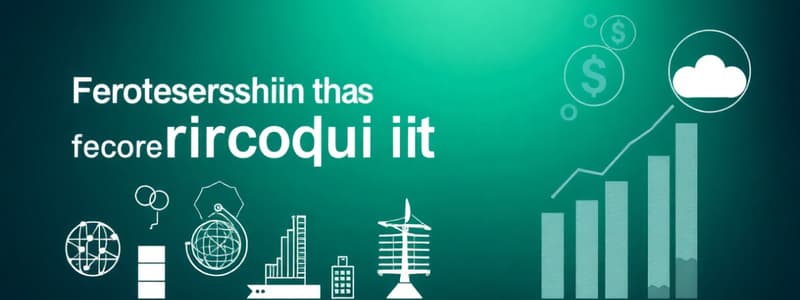Podcast
Questions and Answers
What is business?
What is business?
Any activity involved in the production and distribution of goods and services aimed at meeting the economic needs of consumers with the objective of eventually earning profit.
The four factors of production are land, labor, _____, and entrepreneur.
The four factors of production are land, labor, _____, and entrepreneur.
capital
Which of the following is NOT a reason why people engage in business?
Which of the following is NOT a reason why people engage in business?
- Service to the Community
- Leisure (correct)
- Profit
- Power
Socialism involves private ownership of production.
Socialism involves private ownership of production.
Match the kinds of economic systems with their ownership description:
Match the kinds of economic systems with their ownership description:
What is the difference between profit and expenses?
What is the difference between profit and expenses?
Which of the following best describes a service enterprise?
Which of the following best describes a service enterprise?
What are the phases of economic development?
What are the phases of economic development?
Flashcards are hidden until you start studying
Study Notes
Business Definition
- A business is any activity involved in producing and distributing goods and services to meet consumer needs, aiming to generate profits.
- Businesses produce goods and services that consumers need.
- A business firm uses factors of production to create goods and services, purchasing materials from other producers.
Economics & Factors of Production
- Economics studies how a society produces, distributes, and uses its desired goods and services.
- The factors of production are the economic resources needed for production:
- Land: Natural resources and land itself.
- Labor: Physical and mental inputs of people.
- Capital: Money needed to start and operate a business.
- Entrepreneur: Organizes the other factors, produces goods and services, and aims to satisfy consumer demand.
Profit
- Profit is the difference between an entrepreneur's income and the expenses incurred.
- It's crucial for businesses as it's the primary motivator.
Reasons for Engaging in Business
- Power
- Profit
- Service to the community
- Prestige
- Livelihood
- Social approval
Maslow's Hierarchy of Needs
- Physiological Needs: Essential for survival.
- Safety Needs: Desire for protection against danger.
- Social Needs: Need for belongingness.
- Self-Esteem Needs: Self-recognition or group satisfaction.
- Self-Actualization or Self-Fulfillment: Realization of personal goals.
Kinds of Business
- Industries: Convert raw materials into finished products. Examples: Farming, fishing, mining, manufacturing.
- Manufacturing Industries: Transform materials and supplies into finished products. Examples: Nokia, Honda, Sony, Shell.
- Commerce: Buying and selling goods, moving them from production to consumption. Examples: SM, Rustan's, Robinsons.
- Service Enterprise: Satisfying the needs and wants of customers.
Divisions of Service Enterprise
- Public and Community Service: Meralco, transportation services.
- Professional or Trade Service: Law offices, CPA firms, repair shops.
Kinds of Economic Systems
- Capitalism: Private individuals own and operate the means of production.
- Private ownership and property rights are essential, with investment aimed at personal gain.
- Socialism: The government owns and operates production and capital, providing essential services.
- Communism: The government owns and controls all means of production, including goods for consumption and production.
Phases of Economic Development
A. Means of Livelihood
- Hunting and Fishing Phase: Subsistence through hunting and fishing.
- Pastoral Phase: Farming with livestock.
- Handicraft Phase: Skilled laborers create goods (sculptures, jewelry, furniture).
- Agricultural Phase: Concept of land ownership, farmers and fishermen.
- Industrial Phase: Manufacturing with machinery.
B. Extent of Economic Activity
- Household Economy: Family members satisfy the family's needs.
- Village Economy: Economic and social relations expand across multiple families.
- National Economy: Groups of villages form broader social units.
- International Economy: Countries engage in international trade.
C. Medium of Exchange
- Barter Economy: Direct exchange of goods for goods, services for services, or a combination.
- Money Economy: Use of stable and widely accepted objects as currency.
- Money and Credit Economy: Use of money with credit for delayed payment.
Studying That Suits You
Use AI to generate personalized quizzes and flashcards to suit your learning preferences.




